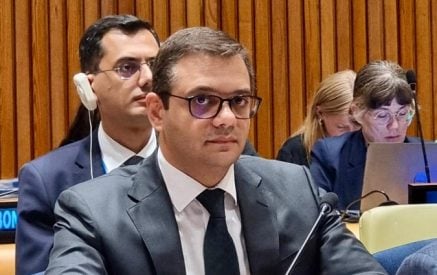On October 3, the National Assembly debated the draft law on Ratifying the Rome Statute of the International Criminal Court signed on 17 July 1998 and on Adopting the Statement on Retroactively Recognizing the Jurisdiction of the International Criminal Court in accordance with Article 12.3 of the Statute.
The Representative on International Legal Matters Yeghishe Kirakosyan stated that currently 123 countries are members of the Statute of the International Criminal Court. Armenia signed the Rome Statute on 1 October 1999, after which the ratification process was suspended, as the Constitutional Court considered some of the obligations stipulated in the Statute to be contrary to the Constitution in 2004.
The rapporteur presented the background of the issue, reminding that the debates on the ratification of the Statute started again a year ago, when Azerbaijan carried out a large-scale aggression against the sovereign territory of the Republic of Armenia, during which the most serious war crimes were committed in the RA sovereign territory as well. From that moment on, the debates regarding the ratification of the Statute and the issue of retroactively recognizing the jurisdiction started again. As a result, the draft of ratification and recognition of jurisdiction of the Rome Statute adopted in 1990 was approved by the Government on 29 December 2022, after which it was submitted to the Constitutional Court. On March 24, 2023, the Constitutional Court made a decision stating that the obligations provided for by the Statute correspond to the RA Constitution. Drafts for ratification and retroactive recognition of jurisdiction were submitted to the Constitutional Court.
“The International Criminal Court investigates serious international crimes within the scope of its jurisdiction, and the purpose of the Court is to bring to justice those who have committed serious international crimes. We are talking about war crimes, crimes against humanity, genocide. There are also new amendments in the Statute, one of which is the amendment implemented at the conference in Kampala, which was made in 2010 and which added the crime of aggression to the list of crimes,” Yeghishe Kirakosyan said.
Read also
According to him, at the moment, the version of the draft without Kampala Amendment has been submitted for ratification. The rapporteur considered it possible to ratify the Kampala Amendment in the future.
The Representative on International Legal Matters expressed an opinion and hope that the ratification of the document can be of significant importance in terms of preventing and excluding the above-mentioned crimes in the RA territory.
The deputies of the NA Civil Contract Faction asked questions to the rapporteur.
The NA President Alen Simonyan inquired which of the post-Soviet countries ratified the document. Yeghishe Kirakosyan informed that it was ratified by two countries. Georgia ratified the Rome Statute in 2004, and Tajikistan, which is both a CSTO and CIS member state, in 2002.
Babken Tunyan asked what the ratification of the document will give to Armenia. The key rapporteur explained that the ratification of the Rome Statute defines the Court’s jurisdiction over the territory of the Republic of Armenia. It will provide a certain guarantee that any serious crime in the territory of the Republic of Armenia will be subject to the jurisdiction of the International Criminal Court, and for those who intend to commit such a crime, this will at least have a preventive effect. “I think that this is no less justification to debate the issue of ratification. Especially taking into consideration the fact that the armed units of Azerbaijan are still located in the sovereign territory of Armenia: The ratification of the Statute is again based on this logic,” the rapporteur said.
According to the Chair of the Standing Committee on State and Legal Affairs Vladimir Vardanyan, this issue has been on Armenia’s foreign policy agenda for 20 years. “The content, nature, roots of the document are such that it seems that Armenia should have been the first country to ratify it. Its roots go back to May 24, 1915, when the Triple Entente states – the Russian Empire, France and Great Britain – first used the term ‘crimes against humanity’ to accuse the Armenian Genocide. For the first time in history, this document sets out in a consolidated form what crimes against humanity are. The UN started dealing with this issue in 1946-1947. The Statute does not provide for any substantive criminal act. It simply stipulates all the actions that are enshrined in the legislation of almost all the states of the world: Genocide, war crimes, crimes against humanity,” the Committee Chair said, clarifying why the issue is being debated at this time. “The fact that there is a large group of people forcibly displaced as a result of ethnic cleansing, a crime against humanity, in the territory of Armenia gives grounds for Armenia to claim at the International Criminal Court that the latter has jurisdiction over this act.”
The draft was debated at the sitting of the Head Committee and was endorsed.
In their speeches, the MPs touched upon the reasons for Armenia’s membership in the International Criminal Court.
The Parliament adopted the draft law with 60 for and 22 against votes. The NA Armenia and With honor opposition Factions voted against.
National Assembly of the Republic of Armenia























































